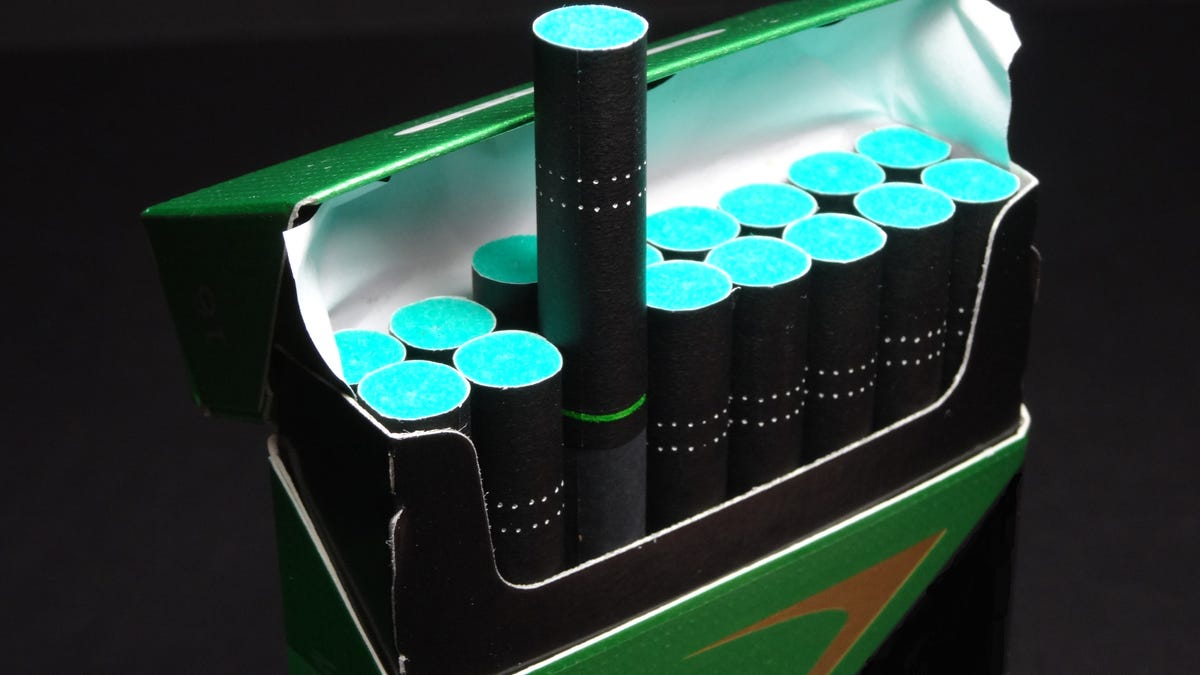Why the Government Wants to Ban Menthol Cigarettes
The FDA proposal highlights the public health benefits of a ban, particularly for African Americans.

More than 40% of cigarette smokers smoke menthols.
The US Food and Drug Administration has proposed prohibiting the sale of menthol cigarettes and flavored cigars. According to the agency, more than 18.5 million Americans smoke menthols, equal to about a third of the cigarettes sold in the US each year.
The FDA proposal highlights the public health benefits of a ban, particularly for African Americans. Several studies have suggested tobacco companies use predatory tactics to market menthol cigarettes to communities of color. Among Black people who smoke, 80% smoke menthols, compared to less than 30% of white smokers.
Health and Human Services Secretary Xavier Becerra said in a statement that the proposed rules were an "important step to advance health equity by significantly reducing tobacco-related health disparities."
If approved, the ban wouldn't go into effect immediately and would not include menthol-flavored e-cigarettes.
Why does the FDA want to ban menthol cigarettes?
While the overall number of smokers in the US continues to trend downward, the percentage of them who smoke menthols has risen -- from 30.5% in 2005 to 43% in 2020, according to The Wall Street Journal.
Massachusetts, Washington, DC, and several other US localities have already banned menthol cigarettes. FDA Commissioner Robert M. Califf told a congressional subcommittee on Thursday that a national prohibition would "reduce the mortality risk of current smokers of menthol cigarettes … by substantially decreasing their consumption and increasing the likelihood of cessation."
In the proposed rule, the FDA and Department of Health and Human Services said the public health benefits of a ban would be most notable among Black smokers, "who have the highest prevalence of menthol cigarette smoking and experience a disproportionate burden of the related harms."
African American men, in particular, have the highest rates of lung cancer in the US, according to the CDC.
In February, the Biden administration said it was reigniting the Cancer Moonshot, a plan to reduce the death rate from cancer in the US by at least 50% over the next 25 years. People who smoke cigarettes are 15 to 30 times more likely to be diagnosed with lung cancer than nonsmokers, according to the US Centers for Disease Control and Prevention, which also linked cigarettes to cancer "almost anywhere in the body."
Research cited by the FDA indicated a ban on menthol cigarettes could lead to a 15% decrease in smoking overall over the next 40 years, preventing between 324,000 and 654,000 smoking-related deaths.
When would the ban take effect?
The FDA's proposal is still open for public comment, which the agency would review before publishing its final rules. That could possibly be sometime in 2023, meaning a ban wouldn't go into effect until at least 2024.
Menthol cigarettes are big business for tobacco companies in the US. Newport, a brand of menthol cigarettes owned by British American Tobacco's R.J. Reynolds, generates about 30% of the company's global profits.
A lawsuit by the company -- or by Altria Group, which produces Marlboro menthols, or Imperial Tobacco, maker of Kool cigarettes -- could delay or derail the ban.
Are menthol cigarettes more unhealthy?
People who smoke menthol cigarettes have a harder time quitting, according to the FDA.
Menthol is a chemical compound found naturally in peppermint and other plants. A 2013 report from the FDA found cigarettes with menthol were no more toxic and or likelier to increase the risk of smoking-related diseases than those without. But, according to both the FDA and the CDC, individuals who smoke menthols have a harder time quitting.
Menthol creates a cooling sensation in the mouth and throat that can lessen the irritation caused by cigarette smoke. That makes them more appealing to young people and first-time smokers, according to the CDC. More than half of smokers under 18 smoke menthol cigarettes.
The CDC also says advertising messages from tobacco companies misleadingly suggest menthol cigarettes "are a 'healthier' alternative."
"The proposed rules would help prevent children from becoming the next generation of smokers and help adult smokers quit," Becerra said in a statement.
Is there opposition to the ban?
Tobacco companies that produce menthol cigarettes have disputed the findings by the FDA and CDC. R.J. Reynolds has said it would challenge a ban in court.
"We believe harm reduction, not prohibition, is the better path forward," Altria said in a statement, as reported by The Washington Post. "Taking these products out of the legal marketplace will push them into unregulated, criminal markets that don't follow any regulations and ignore minimum age laws."
In addition, some leaders in the Black community are concerned a ban would lead to increased police action against people of color. The issue has divided the Congressional Black Caucus: Rep. Robin Kelly of Illinois said she supports the proposal while Rep. Sanford Bishop of Georgia told The Hill a ban "would possibly lead to illegal and unlicensed distribution."
In 2020, when the House of Representatives voted for a menthol ban, the ACLU said it could "instigate unconstitutional policing and other negative interactions with local law enforcement."
Proponents, however, say the FDA's proposal targets manufacturers and retailers, not individual smokers.
"We do not agree with the tobacco industry's message and strategy presented by a few Black leaders: [that] prohibiting menthol cigarettes would be discriminatory," the NAACP said in an April 20 statement. "We reject this view."

